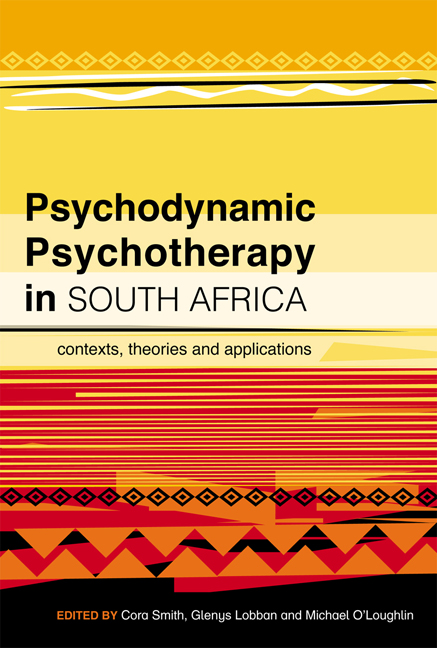Introduction Cora Smith
Published online by Cambridge University Press: 21 April 2018
Summary
With this book we hope to broaden knowledge about how psychodynamic psychotherapy, as well as psychoanalytic concepts and theories are practised and applied in the context of contemporary South Africa. The chapters include a wide range of psychodynamic work undertaken by clinical psychologists working in university settings, state hospitals, community projects, private practice and research. The aim is to provide the reader with an experience of the current debates, clinical issues, therapeutic practice and nature of research that is representative of the work being done in South Africa.
There are a handful of qualified psychoanalysts practising in South Africa at present. Although the South African Psychoanalytic Association was accredited as an official International Psychoanalytical Association study group in 2009, with the ultimate aim of training psychoanalysts in accordance with international standards, only a very few privileged South Africans will be able to pursue such training or afford to undergo the experience of psychoanalysis. The vast majority of South Africans will only have access to briefer forms of psychotherapy, some of which is psychodynamically informed. Most of the psychoanalytically oriented psychotherapy conducted in South Africa is done by clinical psychologists who have been trained at a university offering a psychodynamically oriented Master's degree in Clinical Psychology.
It is within this context of psychodynamic applications that the contributors to this book have written about their work and experience. The approaches described draw on several theoretical models, reflecting the pluralism in the field today. The book is a collective effort by experienced therapists, clinicians, trainers, teachers, clinical supervisors, consultants and researchers working in the field of diversity as it applies to the South African context.
The work described in this volume is situated within the context of post-apartheid South Africa, with all the complexities, hopes, dreams and even disillusionments that have emerged in our fledgling and fragile democracy. With this sociopolitical history in mind, it is important for clinicians to understand that issues of race, disparity, inequality, complicity, reparation, reconciliation, cultural diversity, difference and trauma permeate our practice of psychodynamic interventions. These issues require personal reflection, academic debate, theoretical interrogation and sensitive adaptation in clinical practice.
- Type
- Chapter
- Information
- Psychodynamic Psychotherapy in South Africacontexts, theories and applications, pp. 1 - 10Publisher: Wits University PressPrint publication year: 2013



